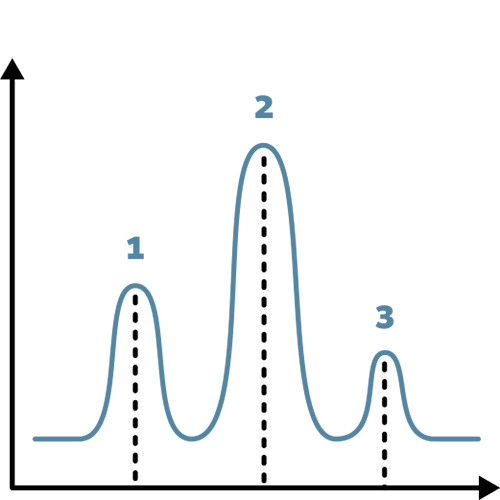Technical centres
IMP has an experimental park located within several technical centres including a certain number of resources belonging to platforms of the Lyon Institute of Chemistry or university institutions.
CHROMatographie
 The CHROMatographie centre of the Lyon Institute of Chemistry, hosted at the IMP and C2PM laboratories, is equipped with the latest liquid chromatography techniques and, in particular, steric exclusion chromatography (SEC) techniques, which allow macromolecules to be separated according to their size and structure.
The CHROMatographie centre of the Lyon Institute of Chemistry, hosted at the IMP and C2PM laboratories, is equipped with the latest liquid chromatography techniques and, in particular, steric exclusion chromatography (SEC) techniques, which allow macromolecules to be separated according to their size and structure.
COATingXpert
 The COATingXpert centre is a pilot platform for the application of paints, process studies and training, comprising an automated semi-industrial chain.
The COATingXpert centre is a pilot platform for the application of paints, process studies and training, comprising an automated semi-industrial chain.
FABrication additive
 The FABrication additive centre brings together the main additive manufacturing technologies and offers a set of versatile means for working on small quantities of material for research, development, screening, etc.
The FABrication additive centre brings together the main additive manufacturing technologies and offers a set of versatile means for working on small quantities of material for research, development, screening, etc.
MICROscopie
 In addition to its own resources, the technical skills of the laboratory’s MICROscopie centre rely on the devices of three microcopy platforms at the Lyon-Saint-Etienne site: CTµ (Microstructure Technology Centre), CLYM ((Lyon Saint-Etienne Microscopy Consortium) et CMES (Stéphanois Electronic Microscopy Centre). This allows access to the AFM electron microscopy techniques.
In addition to its own resources, the technical skills of the laboratory’s MICROscopie centre rely on the devices of three microcopy platforms at the Lyon-Saint-Etienne site: CTµ (Microstructure Technology Centre), CLYM ((Lyon Saint-Etienne Microscopy Consortium) et CMES (Stéphanois Electronic Microscopy Centre). This allows access to the AFM electron microscopy techniques.
PHYsiques
 The PHYsiques centre is equipped with a set of specific devices for measuring and analysing polymer materials:
The PHYsiques centre is equipped with a set of specific devices for measuring and analysing polymer materials:
- Electrical/dielectric and conduction properties
- Diffusion/sorption/permeation properties of gases, vapours and liquids
PROCESS mis en œuvre
 The PROCESS mis en œuvre centre, spread over several IMP sites, offers different technologies for implementing and shaping molten polymers. For example, IMP has a twin-screw reactive extrusion line, a twin-screw formulation line, a co-mixer, a natural polyester spinning line, a co-extrusion line, several types of mixers (batch, cylinder, etc.) and several laboratory-scale shaping pieces of equipment (cast film, sheath, etc.).
The PROCESS mis en œuvre centre, spread over several IMP sites, offers different technologies for implementing and shaping molten polymers. For example, IMP has a twin-screw reactive extrusion line, a twin-screw formulation line, a co-mixer, a natural polyester spinning line, a co-extrusion line, several types of mixers (batch, cylinder, etc.) and several laboratory-scale shaping pieces of equipment (cast film, sheath, etc.).
REACTeurs pilotes de polycondensation
 The REACTeurs pilotes de polycondensation centre offers different technologies for the synthesis and chemical modification of polymers at several preparation scales ranging from a few grams to a kilogram.
The REACTeurs pilotes de polycondensation centre offers different technologies for the synthesis and chemical modification of polymers at several preparation scales ranging from a few grams to a kilogram.
Furthermore, this centre includes extruders dedicated to the reactive extrusion process for polymer synthesis and/or the chemical modification of polymers (synthetic or bio-sourced).
Résonance Magnétique Nucléaire
 The Résonance Magnétique Nucléaire centre of the Lyon Institute of Chemistry, hosted at the IMP, works with three RMN 400 MHz spectrometers equipped with probes and specific accessories for the analysis of polymers in solution: RMN 1D/2D, high-temperature, HR-MAS, diffusion and solid-state, multi-probe analysis. It also has bench-top spectrometers.
The Résonance Magnétique Nucléaire centre of the Lyon Institute of Chemistry, hosted at the IMP, works with three RMN 400 MHz spectrometers equipped with probes and specific accessories for the analysis of polymers in solution: RMN 1D/2D, high-temperature, HR-MAS, diffusion and solid-state, multi-probe analysis. It also has bench-top spectrometers.
RHÉOLogie
 The RHÉOLogie centre, spread over several sites of the IMP, is equipped with a complete set of rheometry techniques to measure the linear and non-linear rheological properties (elongation, high-speed gradient) of the molten to solid polymer materials and low-viscosity liquids. It also offers the possibility of measuring the evolution of several physical properties under a flow (dielectric, optical, birefringence).
The RHÉOLogie centre, spread over several sites of the IMP, is equipped with a complete set of rheometry techniques to measure the linear and non-linear rheological properties (elongation, high-speed gradient) of the molten to solid polymer materials and low-viscosity liquids. It also offers the possibility of measuring the evolution of several physical properties under a flow (dielectric, optical, birefringence).
SPECTROscopie
 The SPECTROscopie centre provides access to several spectroscopy instruments within the UMR: RAMAN, Infrared (near and mid IR) and UV-VIS. These techniques identify the chemical functions or groups of the substance to be studied through vibration or absorption at specific wavelengths. The analyses are qualitative and quantitative. The samples analysed may be in liquid, solid or film form. These devices identify molecules and their composition, or monitor reactions and kinetics (polymerisation, crystallisation, grafting, etc.).
The SPECTROscopie centre provides access to several spectroscopy instruments within the UMR: RAMAN, Infrared (near and mid IR) and UV-VIS. These techniques identify the chemical functions or groups of the substance to be studied through vibration or absorption at specific wavelengths. The analyses are qualitative and quantitative. The samples analysed may be in liquid, solid or film form. These devices identify molecules and their composition, or monitor reactions and kinetics (polymerisation, crystallisation, grafting, etc.).
THERMiques
 The THERMiques centre, spread over several IMP sites, is equipped with a complete set of thermal analysis techniques to measure the properties of polymer materials, such as temperatures and heat flow associated with transitions in polymers, kinetic studies, degradation and composition studies.
The THERMiques centre, spread over several IMP sites, is equipped with a complete set of thermal analysis techniques to measure the properties of polymer materials, such as temperatures and heat flow associated with transitions in polymers, kinetic studies, degradation and composition studies.